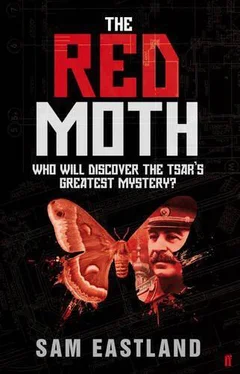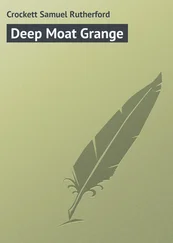Sam Eastland - Red Moth
Здесь есть возможность читать онлайн «Sam Eastland - Red Moth» весь текст электронной книги совершенно бесплатно (целиком полную версию без сокращений). В некоторых случаях можно слушать аудио, скачать через торрент в формате fb2 и присутствует краткое содержание. Жанр: Исторический детектив, на английском языке. Описание произведения, (предисловие) а так же отзывы посетителей доступны на портале библиотеки ЛибКат.
- Название:Red Moth
- Автор:
- Жанр:
- Год:неизвестен
- ISBN:нет данных
- Рейтинг книги:3 / 5. Голосов: 1
-
Избранное:Добавить в избранное
- Отзывы:
-
Ваша оценка:
- 60
- 1
- 2
- 3
- 4
- 5
Red Moth: краткое содержание, описание и аннотация
Предлагаем к чтению аннотацию, описание, краткое содержание или предисловие (зависит от того, что написал сам автор книги «Red Moth»). Если вы не нашли необходимую информацию о книге — напишите в комментариях, мы постараемся отыскать её.
Red Moth — читать онлайн бесплатно полную книгу (весь текст) целиком
Ниже представлен текст книги, разбитый по страницам. Система сохранения места последней прочитанной страницы, позволяет с удобством читать онлайн бесплатно книгу «Red Moth», без необходимости каждый раз заново искать на чём Вы остановились. Поставьте закладку, и сможете в любой момент перейти на страницу, на которой закончили чтение.
Интервал:
Закладка:
Pekkala rested his hand on Stefanov’s arm.
Slowly, he lowered the weapon, but his eyes were fixed on something other than the horse.
Pekkala followed Stefanov’s gaze to where the rider of the horse stood on the path, oblivious to the men who watched him. His own sword had gone through his chest as he came down from the horse. The blade protruded from his back. The cavalryman swayed back and forth, both hands gripping the hilt as if summoning his strength to draw the sword from its scabbard of flesh and bone. His legs, which looked unnaturally thin in his tall riding boots, trembled as he tried to remain on his feet.
Only now did the rider seem to become aware of the two men who were watching him. He spoke to them in a voice no louder than a whisper.
‘What is he saying?’ asked Stefanov.
‘He says his horse is suffering‚’ replied Pekkala.
Stefanov chambered a round in the Schmeisser, removed the magazine and set the barrel of the gun between the horse’s ears. There was a sharp crack as he fired and a tiny, musical ring as the smouldering brass cartridge ejected.
The horse trembled and then it was dead.
The rider was staring at them.
Pekkala walked up to the man and‚ gently prising back the fingers one by one, forced him to release his grip upon the hilt. Then Pekkala took hold of the sword and drew the blade from the rider’s chest.
The cavalryman gasped.
Pekkala dropped the weapon at his feet.
The rider sank to his knees.
The two men stepped past him and continued up the path.
Before the reeds closed up around them, Pekkala glanced back at the rider, who still knelt in the middle of the path, his hands wandering feebly over the place where the sword had gone in, as if by some miracle of touch he hoped to cure himself.
In the plunging red-black darkness before dawn, they reached the edge of the forest. A sweetness of pine replaced the sulphurous reek of the swamp. Once more, the earth was hard beneath their feet.
Here, they stopped to rest.
Stefanov pulled off his boots and poured from them a stream of oily water. Then he lay back on the mossy ground, the rifle lying heavy on his chest, and wiped the rough wool of his sleeve across his sweaty face.
Artillery fire coughed and rumbled on the horizon.
‘What will you do with the lieutenant when you find her?’ asked Stefanov.
‘I don’t know,’ Pekkala replied.
‘She reminds me of a teacher I once had in the school at Tsarskoye Selo.’
‘I think I know the one.’
‘I saw the way you looked at her, Inspector.’
Wearily, Pekkala turned and glanced at Stefanov. But he did not speak.
‘You can’t let Churikova go free,’ said Stefanov‚ ‘no matter what your feelings are for her.’
Still there was no reply from Pekkala.
‘I wish. . ’ began Stefanov.
‘What is it you wish‚ Rifleman?’
‘I wish we had something to eat.’
Pekkala pushed aside his rifle, stood and walked into the forest.
A short while later, he returned. From one hip pocket, he removed some baby fiddle-head ferns and from the other he produced a bunch of wood sorrel, with tiny stems and clover-shaped leaves. Lastly, from his chest pockets came a dozen chanterelle mushrooms, their apricot-coloured flesh as delicate as silk.
Kirov would have fried these in butter, Pekkala thought to himself as he dropped half of them into Stefanov’s outstretched hands.
If there had been more time, Pekkala would have gathered earthworms, dried them in the sun, then ground them to a powder before eating. He would have hunted snails, as well, plucking them like berries from their silver trails over downed trees and stones. They had been one of Pekkala’s favourite foods in Siberia. After baking the snails in hot ashes, he used to prise them out of blackened shells using one of his most prized possessions‚ a rusted safety pin.
The two men ate in silence as the first shades of dawn glimmered eel-green on the horizon.
When the tiny meal was done, Stefanov brushed his hands together and began to roll himself a cigarette. Just before he sprinkled the dried black crumbs of machorka into the shred of old newsprint that would serve as rolling paper, he paused and glanced across towards Pekkala.
Pekkala was watching him.
‘No?’ asked Stefanov.
Pekkala shook his head.
‘Even here?’ protested Stefanov. ‘There’s no one around. I told you these woods are empty!’
‘Not entirely.’ Pekkala nodded in the direction from which they had come.
There, at the edge of the swampy ground from which they had recently emerged, stood a wolf.
It had been following them for some time. Pekkala had heard the beast’s loping tread as it pursued them through the bulrush thickets. But even before he had heard the animal, he’d known that they were being followed. Pekkala could not name what sense had telegraphed the presence of that wolf into his brain, but he had long ago learned to trust it with his life.
The wolf’s head was lowered as it studied them, the black nostrils flexing. The front paws shifted uneasily. Then, unhurriedly, it turned and vanished back among the reeds.
For a moment longer, Stefanov stared at the place where the wolf had been, as if some shadow of its presence still remained. Then he tucked away the tobacco pouch under his shirt. With an agitated groan, he slumped back against the trunk of a pine tree, realising too late that he had leaned his shoulder into a trickle of sap. Stefanov swore under his breath and picked at the honey-coloured smear, which remained stubbornly glued to his tunic. ‘In a few million years,’ he muttered, ‘this would have been treasure, instead of just a pain in my backside.’
Throughout that morning, the two men advanced over the pine-needled ground, where insect-eating plants, with a smell like rotting meat, reared their sexually open mouths.
After months of being on the move, the stillness of these woods was overwhelming for Stefanov. It reached him from beyond the boundaries of his senses, threading through the air like the long stray filaments of spider webs which dangled from the leaves. It walked among the columns of white birch like shadows of people long since vanished from the earth. Only a man like Pekkala‚ he thought‚ could survive for long in such a place.
Late in the afternoon, the two men emerged from the woods into an ocean of tall grass, which trailed out over rolling ground as far as the horizon. After being in the forest, the glare of sky not fractured by a mesh of branches felt strangely threatening.
‘Where is the bridge?’ asked Pekkala.
Stefanov‚ his throat too dry to speak‚ only motioned for Pekkala to follow.
On hands and knees, guns slung across their backs, they crawled through the waist-high grass. Reddish brown seeds clung to their sweat-soaked skin. Grasshoppers with iridescent green eyes catapulted themselves into the air with an audible snap of their legs.
At last, they spotted the bridge, a crude wooden structure which seemed to have no purpose until Stefanov dropped down into a dry stream bed which appeared before them, hidden until they were almost upon it.
These stream beds, known as Rachels, were a common feature of the landscape. In the spring, during the rasputitsa , the gully would be flooded by snow melt. But that was months away and now the bed was powder-dry.
The heat had sapped their energy, but now the two men felt a sudden sense of urgency as they scrambled over the dusty ground until they stood beneath the bridge. Sheltered beneath the heavy planks, zebra stripes of shadow lined their faces.
‘This structure was never meant for heavy vehicles,’ said Stefanov, ‘but since it is the only road from Tsarskoye Selo to Wilno, Engel must bring his truck across it.’
Читать дальшеИнтервал:
Закладка:
Похожие книги на «Red Moth»
Представляем Вашему вниманию похожие книги на «Red Moth» списком для выбора. Мы отобрали схожую по названию и смыслу литературу в надежде предоставить читателям больше вариантов отыскать новые, интересные, ещё непрочитанные произведения.
Обсуждение, отзывы о книге «Red Moth» и просто собственные мнения читателей. Оставьте ваши комментарии, напишите, что Вы думаете о произведении, его смысле или главных героях. Укажите что конкретно понравилось, а что нет, и почему Вы так считаете.











